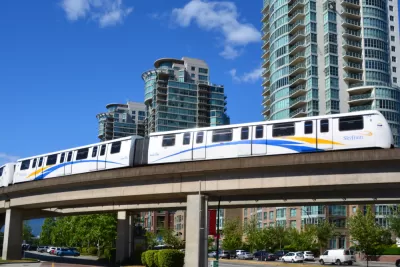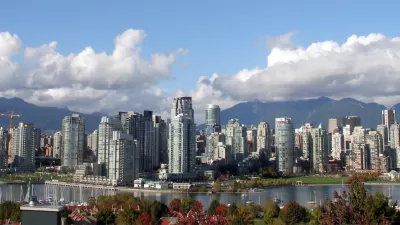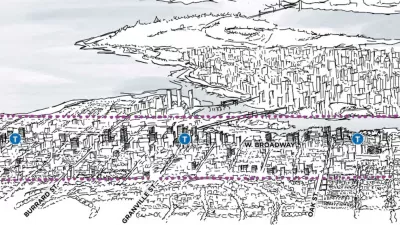On the heels of a billion-dollar federal contribution to Vancouver's SkyTrain, the minister emphasized the need for policies that encourage affordable housing near transit.

Canada's federal minister of infrastructure and communities recently announced a "$1.3-billion contribution to the Surrey-Langley SkyTrain extension of the Expo Line" in Vancouver, writes Kenneth Chan. After the announcement, the minister touted the importance of transit-oriented development and the crucial link between public transit and housing.
"The basic principle of transit-oriented development growth is that more people living and working next to public transit are more likely to use the service if it is of high quality, with the attributes of high frequencies, a sufficient-to-high capacity, and a competitive travel time against driving." Living in one of the world's costliest cities, Vancouverites need efficient transit like the SkyTrain to reach work and downtown amenities. "McKenna says the inclusion of policies that catalyze affordable housing, not just any transit-oriented housing, is a top priority for the federal government’s public transit strategy."
According to the agreement, "[t]he City will seek TransLink and the Province’s input as early as possible in the planning process on applications for developments in close proximity to Surrey-Langley SkyTrain stations to achieve the best possible land use, housing, transportation and design outcomes. The precise geographic limit will be agreed upon by the City and TransLink based on planning considerations such as transit passenger movements, other transportation mode needs and government owned lands."
FULL STORY: Federal minister Catherine McKenna emphasizes importance of transit-oriented growth

Maui's Vacation Rental Debate Turns Ugly
Verbal attacks, misinformation campaigns and fistfights plague a high-stakes debate to convert thousands of vacation rentals into long-term housing.

Planetizen Federal Action Tracker
A weekly monitor of how Trump’s orders and actions are impacting planners and planning in America.

In Urban Planning, AI Prompting Could be the New Design Thinking
Creativity has long been key to great urban design. What if we see AI as our new creative partner?

Portland Raises Parking Fees to Pay for Street Maintenance
The city is struggling to bridge a massive budget gap at the Bureau of Transportation, which largely depleted its reserves during the Civd-19 pandemic.

Spokane Mayor Introduces Housing Reforms Package
Mayor Lisa Brown’s proposals include deferring or waiving some development fees to encourage more affordable housing development.

Houston Mayor Kills Another Bike Lane
The mayor rejected a proposed bike lane in the Montrose district in keeping with his pledge to maintain car lanes.
Urban Design for Planners 1: Software Tools
This six-course series explores essential urban design concepts using open source software and equips planners with the tools they need to participate fully in the urban design process.
Planning for Universal Design
Learn the tools for implementing Universal Design in planning regulations.
Gallatin County Department of Planning & Community Development
Heyer Gruel & Associates PA
JM Goldson LLC
City of Camden Redevelopment Agency
City of Astoria
Transportation Research & Education Center (TREC) at Portland State University
Jefferson Parish Government
Camden Redevelopment Agency
City of Claremont





























